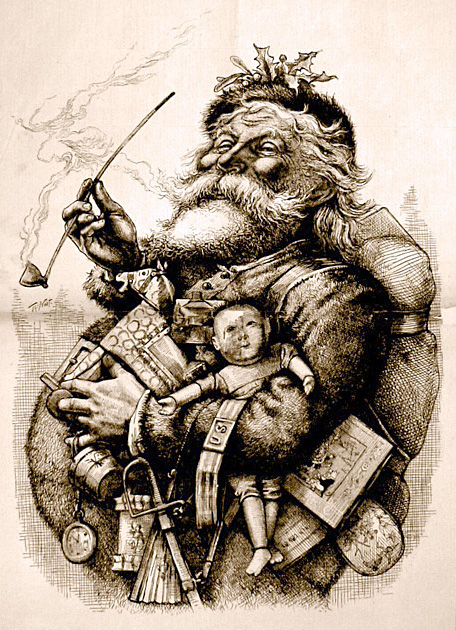
“Merry Old Santa Claus” by Thomas Nast, 1881
Many of the traits now attributed to Santa Claus in English-speaking countries — jolliness, rotundity, eight tiny reindeer, a penchant for sleigh travel and chimney diving — have their origin in the classic poem “Twas the Night Before Christmas,” written in 1823 by Clement Clarke Moore. In a new picture book version “edited…for the benefit of children of the 21st century,” however, the illustrations and text bear no trace of another accessory: Santa’s pipe and the smoke that “encircled his head like a wreath.”
Canadian anti-smoking advocate Pamela McColl self-published her version of the poem with digital illustrations by Elena Almazova and Vitaly Shvarov. McColl says she excised the single couplet that mentioned the old elf’s pipe habit because in the eyes of children, “[h]e’s a real character. He’s a real person coming down the chimney, and he’s smoking.” She also says she has encountered children who know the dangers of smoking and are concerned for Santa’s health.
The American Library Association’s Office for Intellectual Freedom disagrees with the bowdlerization of Moore’s work, however. In a press release, OIF Deputy Director Deborah Caldwell-Stone said:
This wasn’t a retelling. This wasn’t a parody. This wasn’t an adaptation. This wasn’t a modernization. This wasn’t fanfic. This was presenting the original but censoring the content. That kind of expurgation that seeks to prevent others from knowing the original work because of a disapproval of the ideas, the content, is a kind of censorship that we’ve always disapproved of.
The editing of a classic to conform to modern sensibilities recalls the 2011 publication of a version of Mark Twain’s Adventures of Huckleberry Finn in which every instance of the word “nigger” — a term that has lead to multiple challenges against the book and is considered by many to be offensive — was replaced by “slave.” OIF Director Barbara Jones argued passionately for the integrity of the original work:
In my view, this latest effort to censor “Huck Finn” only underscores a lack of confidence in Americans’ ability to think for ourselves and to grapple with difficult and painful issues. In our well-meaning efforts to protect children from an increasingly chaotic world, we are stifling their ability to confront uncomfortable issues and to work them out in a safe, supportive environment of the home, school or library. We are indeed missing a teachable moment.
But, you argue, isn’t this expurgation going to make it possible for more young people to read the book? I say: If they read the expurgation, they are not reading “Huck Finn.” If this book were not out of copyright, the author would not allow this kind of basic change to his words.
Although the editing of Moore’s work is on a smaller scale, it seems likely that he also would not appreciate such a compromise of his creative vision and disruption of his verse. Happily, there remain numerous picture book editions that include the full text of the poem.
This holiday season, The Will & Ann Eisner Family Foundation is encouraging everyone who believes in the CBLDF’s important work protecting the freedom to read comics to become a member or give a gift membership in the organization. When you do, they will contribute $10 for each new membership and $5 for every renewing membership made from now until December 31, so join today!
Maren Williams is a reference librarian who enjoys free speech and rescue dogs.